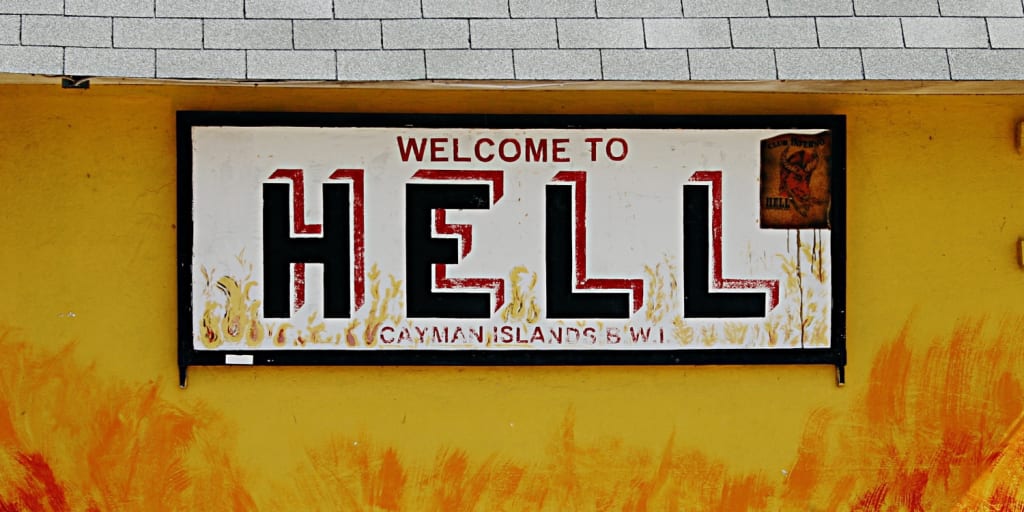The Messy And Incoherent Philosophy of Diablo 4's Lilith
Free will, Social Darwinism, and demons

Diablo 4 was released this year. For the uninitiated, Diablo's universe revolves around the perpetual struggle between the forces of Heaven and Hell. Humanity is caught in the middle of this Eternal Conflict, often manipulated and used as pawns by these greater beings. Sanctuary, the world where humans reside, was co-created by Lilith, the daughter of hatred, who, in Diablo 4, returns from hell with a grand plan that supposedly revolves around aiding humanity against the forces of evil.
This much-awaited sequel has rich graphics, intense battles, and a sprawling, if sometimes empty open world. There was a lot I liked (and didn't like) about this grimdark fantasy world. It was fun to revisit the world of Sanctuary, even if the combat could get repetitive, and the item system was a chore.
However, many players might agree that it leaves quite a bit to be desired when it comes to the storytelling department. One of the most glaring issues when we dive into the game's narrative is the underlying philosophy of the main antagonist, Lilith, and how little sense her plan appears to make.
Lilith's Muddled Philosophy
As you progress in the game, you will find that the storyline often swerves into realms of inconsistency. An excellent example is a quest where the player seeks the guidance of the "Tree of Whispers" only to come out empty-handed. The Tree of Whispers is built up as this seemingly all-knowing entity that is beyond even the world of Sanctuary. Yet, it conveniently is powerless to do more than point the player forward (see the "your princess is another castle" trope).
Another inconsistency is the much-hyped threat of a "Lesser Evil" named Andariel. The arc in the mid-game was Lilith's lieutenant Elias trying to summon and bind this Lesser Evil to give her forces an edge against hell. Your companion Lorath asserts "that a lesser could wipe out the continent." And yet, we neutralize Andariel in a single encounter that shows up somewhat randomly. The same thing happens for Lesser Evil Duriel, who appears without any buildup in an underground cavern (probably to reference the second game). "Lorath spoke of Lesser Evils beyond Andariel. Could that thing have been one?" our protagonist says, unsure.
Such events, while individually engaging, leave players scratching their heads when trying to piece together the overarching plot and message of the game. It feels like a collage of events rather than a smooth storyline. Diablo 1 and 2 (we don't speak of 3) never had complex storytelling, but at least you understood what was happening. The hunt in those games involved chasing one person or going further downward into the pits of hell. Here, we have a character chasing Lilith and then abandoning that chase for Elias, who you catch, only to go after Lilith again, who is now driven by a completely different motivation. The plot of this game was a mess, with large parts of it having been better off if they were cut.
Lilith's characterization is at the epicenter of this narrative inconsistency. Being the mother of humanity and co-creator of Sanctuary alongside the angel Inarius, one would assume that her motivations and actions would be the focus of this game. Even if the plan is solely about concentrating power around herself, we should understand what she's trying to do.
However, Lilith's philosophy is elusive at best. She preaches a form of Social Darwinism, advocating for the survival of the fittest. "I have not come to save," she tells her follower Elias, "but to empower. In my shadow, the strong will oppose the might of hell itself. Let the weak fend for themselves."
Yet, her plan and its execution do not seem to align. Under her brief rule, several empires crumble, and the world of Sanctuary deteriorates. Instead of uniting humanity's strongmen against the Prime Evils like Diablo, Mephisto, and Baal, Lilith seems to cause more chaos and destruction in her wake. We do not see armies raised to martial against the forces of hell: she enters hell alone, slaughtering many of her followers to get there. All resources seem devoted to summoning demons and making herself more powerful. Her ultimate ambition is revealed to be absorbing the powers of her father, Mephisto, Lord of Hatred, to become a Prime Evil, which is more about extending her power than aiding humanity.
Characters such as antagonist Kerrigan Queen of Blades from Starcraft (another Blizzard property) also had their arc be about accumulating power, and that plot was straightforward and easy to follow. There is nothing wrong with going in the direction of a villain’s motivation to simply be self-enrichment, but this game seems torn between wanting Lilith to be an "unapologetic badass who is in it just for herself" and wanting to "save" the people she birthed into the world. It makes the overall plot and message of Diablo 4 confusing.
To provide a clearer perspective on what it looks like when a villain's philosophy drives the narrative, let's look at another pop culture villain: Thanos from the Avenger's Infinity Saga. Thanos gathered a bunch of McGuffins called the Infinity Stones so he could snap his fingers and wipe out half of all life: he's doing one simple thing, and at least initially, he succeeds.
Though his methods were undoubtedly monstrous, Thanos operated on a neo-Malthusian philosophy. He believed that the universe's resources were finite and that overpopulation led to suffering. Hence, in his twisted way, wiping out half of all life was, to him, a 'necessary' act to restore balance and make a better galaxy. It's a heinous act, but from a storytelling perspective, his philosophy is consistent both within the narrative and to the viewer.
On the contrary, Lilith's motivations swing like a pendulum. One moment, she wishes for the protagonist to lead, and the next, she wants to seize power for herself. The following second, she preaches Social Darwinism as a means of uplifting humanity. She speaks of breaking the cycle and freeing humanity from the Eternal Conflict. Still, her actions invariably lead to more chaos, making her seem like just another power-hungry autocrat rather than a complex antagonist with a coherent vision.
It would have been refreshing if this hypocrisy was the point of the narrative. There were the bones of an interesting story here that could have focused on how the paternalism of savior figures ultimately can corrupt even the purest of motivations. Lilith, the person who spurned hell to create something new, is a deeply sympathetic character. She cares for her "children" but is also paternalistic, claiming that humanity is lost without a "shepherd to guide them." Without her.
I wanted to see that hypocrisy picked at a little more, but the game is unwilling to have this conversation. Near the end of the last act, our protagonist converses with Lilith in a mind palace. She begs us to join her and lead humanity by her side, and our character rejects it without much commentary. "I will never take your hand," they say, but we aren't given a reason, and the entire conversation on free will and paternalism is sidestepped.
A fiery conclusion
Despite her captivating presence and potential, Lilith falls prey to inconsistency after inconsistency in Diablo 4. It's clear from the ideas presented that the game wanted to have a nuanced conversation about free will, the nature of good and evil, and much more, but it doesn’t quite go far enough to tell a cohesive story around these themes.
It would have been interesting to see Lilith create some political structure around her grand vision of Social Darwinism. We noticed that briefly with Brol and his cannibal city-state. Perhaps the entire game could have focused more on that angle, as Lilith seeks to create stronger and stronger humans, no matter the cost. Her bid to absorb Mephisto's power could have been recontextualized as her wanting to transfer that power into humanity itself: all of us taking ownership of the forces that seek to destroy us.
There were many things the game could have done to accentuate the themes of Social Darwinism and free will better. However, instead of being the game’s driving philosophical force, Lilith ends up a puzzling enigma, leaving players not in awe of her grand design but rather questioning its very foundation.
One can only hope future installments or expansions might shed more light on her motivations and provide the depth she truly deserves.
About the Creator
Alex Mell-Taylor
I write long-form pieces on timely themes inside entertainment, pop culture, video games, gender, sexuality, race and politics. My writing currently reaches a growing audience of over 10,000 people every month across various publications.






Comments
There are no comments for this story
Be the first to respond and start the conversation.